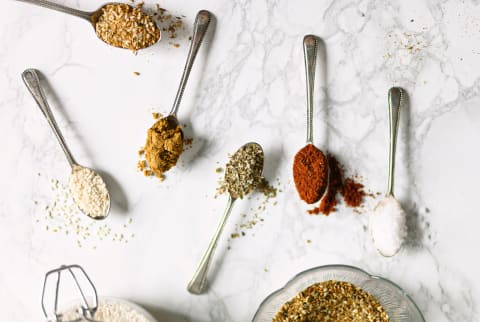Advertisement
5 Anti-Inflammatory Spices This Functional Food Expert Recommends For Cooking


When it comes to anti-inflammatory spices, the one that gets all the hype is turmeric—which is fair! "Turmeric's active compound, curcumin1, has been extensively studied for its disease-fighting potential and preventive health benefits2," explains Jessica Cording, M.S., R.D., CDN.
So when we saw that spice and functional food expert Kanchan Koya, Ph.D., shared a list of her favorite anti-inflammatory spices on Instagram, we started taking notes. After all, we're all about stocking our cabinet with a handful of spices that pack, as Koya writes, "inflammation-fighting powers."
Cayenne
Cayenne is great for adding more spice, and also more anti-inflammatory power3. If you're cooking for kids or people who aren't able to handle the spice, Koya suggests using paprika—which, if you didn't know, also comes from dried chili peppers. Other benefits of cayenne include its status as a source of valuable phytonutrients and plenty of necessary vitamins, including potassium and magnesium.
For recipe ideas, try this R.D.-approved bean chili or even this spice-packed Bloody Mary recipe.
Black pepper
When we cook with turmeric, we always include a pinch of black pepper, "which enhances the absorption of curcumin 20-fold," nutritional psychiatrist Uma Naidoo, M.D., told mbg. But on its own, it's a spice to be reckoned with, too. The active ingredient in black pepper, piperine, has been linked to fighting inflammation4 in some studies.
Use it in Naidoo's comforting golden latte or try this caponata recipe.
Sumac
When we talked to Koya last year, she was quick to bring up sumac as the one spice we should all be adding to our spice rack. As she told us, though it might be seen as a "newcomer" in Western cultures, sumac has a long history of use in Eastern cultures. Because it's rich in beneficial phytonutrients and antioxidant compounds (called anthocyanins), it has serious potential as an anti-inflammatory5.
Use it in this side of sweet potatoes and kale.
Nutmeg
Of the list Koya shared, we were most surprised by this one—maybe because nutmeg has been in our cabinets for years without a second thought. But nutmeg is actually packed with anti-inflammatory compounds6 called monoterpenes, specifically ones called sabinene, terpineol, and pinene.
It's an essential baking ingredient (like in this zucchini bread), but it's also a great addition to this apple pie granola.
Cinnamon
Another go-to, this spice has powerful anti-inflammatory properties7. If you're someone who reaches for cinnamon on the daily, you might want to check what kind is in your pantry. According to Koya, Ceylon cinnamon is safer for everyday use because of its lower concentration of coumarin8 (which may be harmful to the liver in large amounts) than Cassia cinnamon. If you're not sure what you have, it's probably Cassia.
The ultimate way to use cinnamon? In these vegan, gluten-free cinnamon rolls.
Wanna really maximize your spice use for health? We love this seven-spice blend Koya recommends for supporting gut health in everyday cooking, like roasting veggies and using it to top our favorite soups.
8 Sources
- https://www.ncbi.nlm.nih.gov/pmc/articles/PMC3535097/
- https://www.ncbi.nlm.nih.gov/pmc/articles/PMC5664031/
- https://www.ncbi.nlm.nih.gov/pmc/articles/PMC5895990/
- https://pubmed.ncbi.nlm.nih.gov/29370858/
- https://pubmed.ncbi.nlm.nih.gov/22228951/
- https://www.ncbi.nlm.nih.gov/pmc/articles/PMC5222521/
- https://pubmed.ncbi.nlm.nih.gov/15710356/
- https://pubmed.ncbi.nlm.nih.gov/24148965/